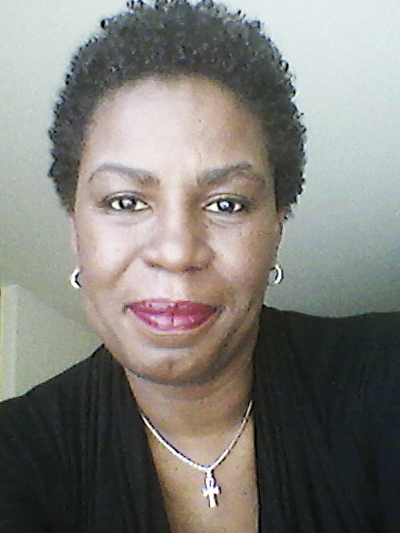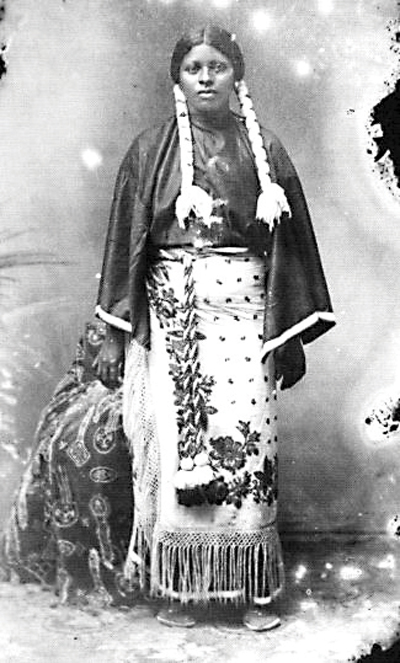A black woman’s crusade to discover her lineage
July 2, 2012 by Las Vegas Black Image Magazine
Filed under Cover Story, Feature, Highlights
by Kimberly Bailey-Tureaud

- Rhenetta Belcher-Bey decided to learn more about her heritage after the birth of her youngest daughter.
It was 1999 when Las Vegas resident Rhenetta Belcher-Bey first took a deep interest in learning more about her heritage. The occasion: the birth of her youngest daughter.
Always aware of skin tone variations in her family, a natural curiosity on the subject had always been embedded in Belcher-Bey’s consciousness. “My family had a limited oral history, but I knew there was more history there trapped in the archives of my great-great- grandmother’s family,” she said. “She was a light-skinned woman with coal black hair, so I knew there was something more that I needed to uncover.”
Belcher-Bey’s first inspiration was to search through slavery records. Then, while visiting a bookstore, she was struck by a book on American genealogy. One page contained a history of African-Americans, and the direct opposite page featured a history of Native Americans.
“I went through the African-American section first — and out of divine intervention, I looked at the Native American section,” she recalled. “As I was reading through, I found the term ‘Five-Civilized Tribes’ — and the connection between my Native American heritage (father was full-blooded Cherokee) and the Moors was realized.”
The Moors originated in Northern Africa. Upon arriving in what is now Spain, in the year 711, they eventually became the first Africans to conquer part of Europe. As Belcher-Bey remembers it, “It was shocking that the Five Civilized Tribes — listed as the Cherokee, Choctaw, Muscogee (Creek), Chickasaw and Seminoles — all (identified with) Moors.
Belcher-Bey then became eager to find the link between the Five Civilized Tribes and the maternal side of her family. She spoke to her mother, who was born in 1936, to obtain additional information about her great-great-grandmother.
“My mother remembered her name, and I noticed that there was a pattern in our family’s names,” she recalled. “I went to various Census Bureaus to locate the name patterns, and then I checked the Five Civilized Tribes’ rolls, and I found her name and my family’s name there. I was in shock.”
The realization that her family wasn’t brought to America through the African slave trade — as once thought — was a significant find. Her great-great-grandmother was full-blooded Choctaw.
“There were a tremendous number of black people already in America before the slave trade that didn’t come over from the Bering Strait — the Native Americans of African descent,” said Belcher-Bey. “Now, there were Native Americans of Asian descent that did come over the Bering Strait, but there is a whole story of Native Americans who were already in America that has been deleted from history. They were of African descent — (descended from)the Moors.”
Belcher-Bey takes tremendous pride in her ties to such a deep history. The Moors, she noted, were among the first literate people, credited with early advancements in science, mathematics, astronomy and other disciplines.
“I am doing monthly forums at various libraries throughout the valley to assist people in discovery of their ancestry,” she said. “I will show people what I did, with the reference books I used, along with the computer. Then it is up to them to take it from there. If my great-great-grandmother didn’t participate in the roll call of her people, I would have never been able to find this information. We shouldn’t run away from the census that the government conducts — for the sake of our own legacy.”
“I was first looking in slave rolls and property records to find more information about myself and my family. I had no idea that I was actually of Native American descent. I have always heard, ‘You have good hair because of that Indian in you.’ Now, I know that this statement really goes a long way, as accounted for in the oral history from our ancestors. The oral history served a purpose, but we have to learn to document our history from our elders and family. Our birthrights are valuable and a lot has been hidden from black people for generations. My (advanced) degrees didn’t necessarily tell me about my ancestry, but they did show me how to get it.
It was 1999 when Las Vegas resident Rhenetta Belcher-Bey first took a deep interest in learning more about her heritage. The occasion: the birth of her youngest daughter.
Always aware of skin tone variations in her family, a natural curiosity on the subject had always been embedded in Belcher-Bey’s consciousness. “My family had a limited oral history, but I knew there was more history there trapped in the archives of my great-great- grandmother’s family,” she said. “She was a light-skinned woman with coal black hair, so I knew there was something more that I needed to uncover.”
Belcher-Bey’s first inspiration was to search through slavery records. Then, while visiting a bookstore, she was struck by a book on American genealogy. One page contained a history of African-Americans, and the direct opposite page featured a history of Native Americans.
“I went through the African-American section first — and out of divine intervention, I looked at the Native American section,” she recalled.
“As I was reading through, I found the term ‘Five-Civilized Tribes’ — and the connection between my Native American heritage (father was full-blooded Cherokee) and the Moors was realized.”
The Moors originated in Northern Africa. Upon arriving in what is now Spain, in the year 711, they eventually became the first Africans to conquer part of Europe. As Belcher-Bey remembers it, “It was shocking that the Five Civilized Tribes — listed as the Cherokee, Choctaw, Muscogee (Creek), Chickasaw and Seminoles — all (identified with) Moors.
Belcher-Bey then became eager to find the link between the Five Civilized Tribes and the maternal side of her family. She spoke to her mother, who was born in 1936, to obtain additional information about her great-great-grandmother.
“My mother remembered her name, and I noticed that there was a pattern in our family’s names,” she recalled. “I went to various Census Bureaus to locate the name patterns, and then I checked the Five Civilized Tribes’ rolls, and I found her name and my family’s name there. I was in shock.”
The realization that her family wasn’t brought to America through the African slave trade — as once thought — was a significant find. Her great-great-grandmother was full-blooded Choctaw.
 “There were a tremendous number of black people already in America before the slave trade that didn’t come over from the Bering Strait — the Native Americans of African descent,” said Belcher-Bey. “Now, there were Native Americans of Asian descent that did come over the Bering Strait, but there is a whole story of Native Americans who were already in America that has been deleted from history. They were of African descent — (descended from)the Moors.”
“There were a tremendous number of black people already in America before the slave trade that didn’t come over from the Bering Strait — the Native Americans of African descent,” said Belcher-Bey. “Now, there were Native Americans of Asian descent that did come over the Bering Strait, but there is a whole story of Native Americans who were already in America that has been deleted from history. They were of African descent — (descended from)the Moors.”
Belcher-Bey takes tremendous pride in her ties to such a deep history. The Moors, she noted, were among the first literate people, credited with early advancements in science, mathematics, astronomy and other disciplines.
“I am doing monthly forums at various libraries throughout the valley to assist people in discovery of their ancestry,” she said. “I will show people what I did, with the reference books I used, along with the computer. Then it is up to them to take it from there. If my great-great-grandmother didn’t participate in the roll call of her people, I would have never been able to find this information. We shouldn’t run away from the census that the government conducts — for the sake of our own legacy.”
“I was first looking in slave rolls and property records to find more information about myself and my family. I had no idea that I was actually of Native American descent. I have always heard, ‘You have good hair because of that Indian in you.’ Now, I know that this statement really goes a long way, as accounted for in the oral history from our ancestors. The oral history served a purpose, but we have to learn to document our history from our elders and family. Our birthrights are valuable and a lot has been hidden from black people for generations. My (advanced) degrees didn’t necessarily tell me about my ancestry, but they did show me how to get it.







I like the helpful info you supply in your articles. I will bookmark your weblog and check again right here regularly.
I am slightly certain I will learn many new stuff right right here!
Good luck for the next!
A person necessarily help to make seriously posts I would state.
This is the first time I frequented your web page and up to now?
I amazed with the research you made to create this particular publish extraordinary.
Magnificent activity!